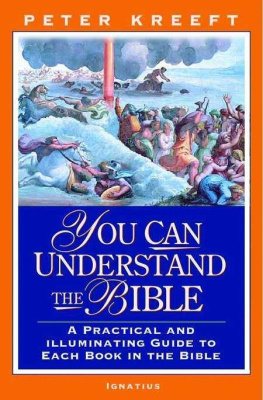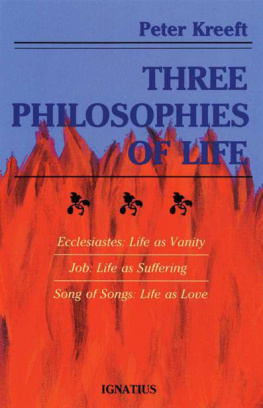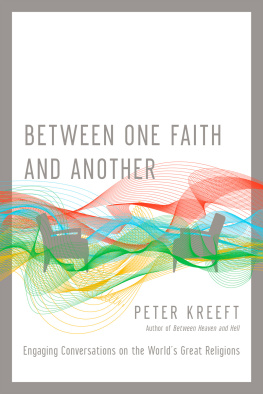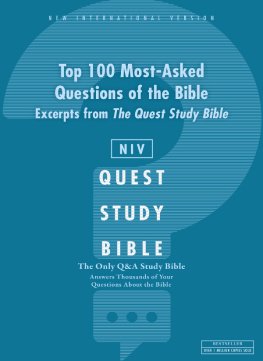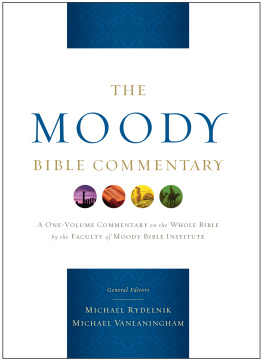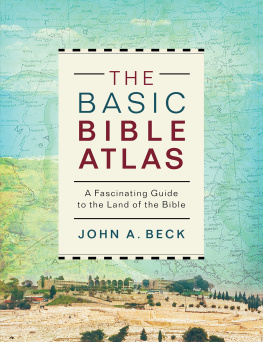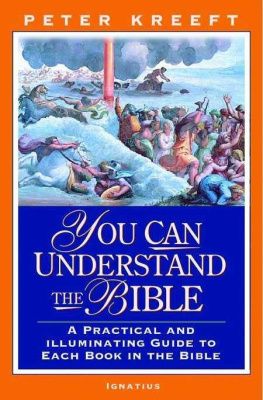YOU CAN UNDERSTAND THE BIBLE
PETER KREEFT
YOU CAN UNDERSTAND THE BIBLE
A Practical Guide to Each
Book in the Bible
IGNATIUS PRESS SAN FRANCISCO
FOUR
_____
The Divine Rescue Operation: Genesis Continued
The three stages of historycreation, fall, and redemptionare reflected in the three parts of Genesis. This third chapter explores the third and longest part, Gods redemption or buying-back of His creatures who sold themselves into Satans slavery.
This began immediately after the fall in chapter three, when God pronounced the curses on Satan (vv. 14-15), on Eve (v. 16), and on Adam (vv. 17-19). All these punishments are also mercies for us. These are like tourniquets, stemming the flow of blood, or like quarantines, stopping the spread of disease.
Death is the most obvious example. We know little about many of the names in the genealogies, but we know with certainty the one thing repeated about every single one: And he died... and he died... and he died.
The next event narrated, after the fall, is a deathin fact, a murder. Not every death is a murder, but all death is a consequence of sin. Thus murder shows the meaning of death more clearly than a so-called natural death does. Cains murder of Abel is the Fall flowing out, like Abels blood. It is a kind of icon of our whole fratricidal history of violence, both inner and outer, both small and great.
Gods Radical Surgery
Such a radical disease requires a radical surgery. Without the shedding of blood there is no forgiveness of sins (Heb 9:22).
The City of God and the City of the World began to exist side by side as opposite movements of the human heart as soon as Adam and Eve fell into knowing good and evil rather than good alone. But with Cain and Abel these two cities begin to exist as two groups of people. Cain and Abel are the fathers of the two spiritual races that subsequently divide all human history: the damned and the saved, the once-born and the twice-born.
When we come to Abraham in chapter 12, the style of narrative changes. Historians can pin down specific dates, places, names, and cross-references in secular history from Abraham onward, but there is no way of knowing when Noah lived or perhaps even whether he and his flood are meant to be archetypal symbols or literal facts. Between the symbolic style of the first three chapters and the literal history of the story of the chosen people, which begins with the call of Abraham in chapter 12, there are eight borderline chapters that could reasonably be interpreted either way.
When God changes Abrams name to Abraham and Jacobs to Israel, He does something only God can do, because for the Hebrews your name means not your social label but your divinely ordained nature, character and destiny. Thats why Jesus was implicitly claiming divinity when He changed Simons name to Peter (Jn 1:42).
The call of Abraham in Genesis 12 comes right after the Tower of Babel in chapter 11 to contrast mans way with Gods way. The tower symbolizes all proud human attempts to conquer heaven and happiness by force, or to create a heaven on earth by our own cleverness (language, reason, science, technology). Throughout the Bible, the symbolism remains the same: all human towers to Heaven tumble, and all divine descents succeed. Our way up always turns out to be a way down, and all divine ways down turn out to be the way up. The Messiah is the prime example.
How reasonable the Tower of Babel sounds, and how silly the call of Abraham seems! What a way to fight the serious battle against evilto pick out one man, flawed like all of us, for a lifelong trek into the wilderness with no road map and no guarantees, only promises. Yet this is the beginning of historys most public miracle: the Jewish people. Their survival and continued rejuvenation, their unparalleled flourishing and achievements, out of all proportion to their tiny size and strength, violate every known law of history and sociology. The more we consider their history, the more we are in awe at divine providence. The more we open our eyes to see, the more we open our mouths to gasp.
Consider just one incident in the long Joseph story, found in chapters 37 to 51. If one Egyptian tailor had not skimped on the thread of Josephs mantle, no Jew would be alive today. That mantle came apart in the hands of Potiphars wife, who was thus able unjustly to accuse Joseph of attempted rape and get him imprisoned, where he met Pharaohs butler and baker and interpreted their dreams, thus coming to Pharaohs attention, interpreted his dreams, and saved Egypt from famine by his divine gift of prophecy. Only the grain preserved by Josephs prophetic gift saved his family in Palestine who had sold him into slavery, when he finagled their coming to Egypt. Thus, generations later, we have hordes of healthy Jewish slaves in Egypt, ripe for Moses liberation in the Exodus, and all their subsequent history.
In international diplomacy that divine technique is called brinkmanship. In chess, its called a wild gambit. In gambling, its called going against the odds. Gods style is not conservative!
Notice how God uses His own enemy, evil, against itself and for good. The obvious lesson of the whole long story of Joseph and of all human history miniaturized here, is providence (see Rom 8:28). Or, as Joseph tells his brothers about their having sold him into slavery, You meant evil against me, but God meant it for good (50:20). God writes straight with crooked lines. He used Satan, Judas, Pilate, and Caiaphas to crucify Christ and thus redeem the world!
God has nothing but flawed instruments to work with. There is a striking contrast between the heroes of Genesis and the heroes of pagan mythology. The men of the Bible are real: flawed, weak, stupid, sinful. Adam, Noah, Abraham, Isaac, Jacob, Mosesevery one of them is a spiritual klutz, learning only through repeated mistakes. What makes them heroes is not their strength but their faith. They believe: that is, they let God be God, they open the door to the real power, the real success, which is Gods activity, not their own.
We can all do that. Thus we can identify with these heroes, as we cant identify with Hercules (unless were Rambo) or Aphrodite (unless were Marilyn Monroe).
A God of Infinite Justice and Infinite Love
Its often said that the Old Testament, especially Genesis, teaches a God of justice, in stark contrast to Jesus, who teaches a God of forgiveness and love. It is a lie, of course. The God of the Old Testament does all that He does out of love; and the Father of Jesus needs to satisfy justice as well as love; thats why Jesus had to die. I used to think that only those who never read the Bible could fall for this fallacy. But experience has taught me otherwise. Why is it so common?
I think it comes partly from misunderstanding the literary style of Genesis. It is not meant to be psychology, either of God or humanity. The modern style of storytelling emphasizes psychological motive and scrutinizes inner consciousness. This is simply not the style of premodern writing. Augustines Confessions is the only personal introspective autobiography in premodern literature.
Thus the wrath of God is not meant as a description of Gods own private feelings, but of His public deeds, of how those deeds look to fallen, wrathful man. Psychologically, this is projection. When God gave Lady Julian of Norwich a showing of His wrath, she said, I saw no wrath but on mans part.
God is indeed a God of justice and thus of punishment, which is part of justice. But love is the motive behind all His deeds of discipline. For the Lord disciplines him whom he loves.... If you are left without discipline, then you are illegitimate children and not sons (Heb 12:6-8).
Next page
